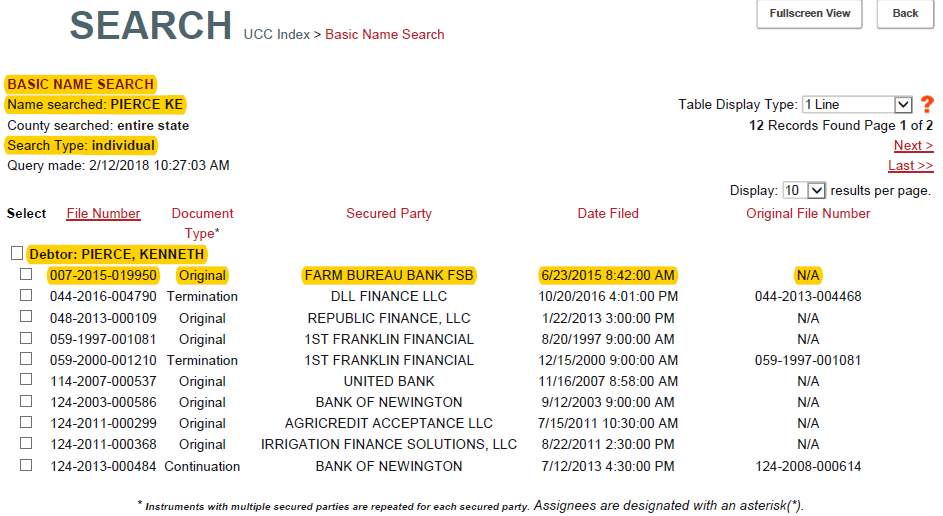
Do You File UCCs? What Happens to a Security Interest When the Secretary of State Makes an Error?
Compliance with Article 9 of the Uniform Commercial Code is critical to perfect your security interest. But, what happens if you comply with Article 9 and take the proper steps to perfect your security interest, only to have the Secretary of State incorrectly index your filing? Errors and mistakes happen.
“The Secretary of State does make mistakes occasionally…and either the searcher or the filer must suffer the consequences in priority based upon those mistakes.”
Read today’s post to learn more about indexing errors and how Article 9 protects creditors when the recording office makes a mistake.
The Bankruptcy Case of The Feed Store, LLC
The Feed Store, LLC (Debtor) obtained a loan from Peoples Bank, N.A. (Bank) and in consideration of the loan, the parties executed a promissory note and security agreement. Within the security agreement, Debtor granted Bank a security interest in “all inventory, chattel paper, accounts, equipment and general intangibles, together with all proceeds, accessions, additions, replacements and substitutions related thereto.”
April 23, 2012, Bank filed a UCC-1 with the West Virginia Secretary of State (WV SOS) to perfect its security interest. Unfortunately, WV SOS incorrectly indexed Bank’s UCC filing, by assigning the same instrument number to two different documents, one of which was Bank’s UCC filing.
The indexing error went unnoticed until March 14, 2017, when WV SOS entered a statement that it issued one instrument number to two different filings and would issue a new instrument number for Bank’s filing. Then, April 12, 2017, Bank filed a continuation, within the 5 year period.
Meanwhile, in December 2016, Debtor filed for bankruptcy protection under Chapter 7.
In March 2017, the bankruptcy trustee filed a complaint, alleging Bank’s security interest was seriously misleading, because the filing did not appear in a search via WV SOS database. Further, the trustee argued the constitutionality of “West Virginia Code § 46-9-517, which ‘imposes the risk of filing-office error on those who search the files rather than on those who file.’”
Someone Has to “Suffer the Consequences”
According to the court opinion, “The Trustee alleges that the effect of West Virginia Code § 46-9-517 deprives him, as a judicial lien creditor, of priority over Peoples Bank’s lien without constitutionally-sufficient notice…” I won’t dwell on the constitutionality of the law, but as the legal opinion states someone must “suffer the consequences.” In other words, someone wins & someone loses.
In this case, the filing did not appear in the search, because WV SOS incorrectly indexed the filing, not because Bank failed to properly complete its filing. It would, of course, have been different if Bank incorrectly identified Debtor on its Financing Statement.
Mistakes & errors exist, and fortunately Article § 9-517 accounts for indexing errors: “The failure of the filing office to index a record correctly does not affect the effectiveness of the filed record.”
Although the trustee doesn’t believe it should suffer for the indexing errors of WV SOS, the court was not persuaded by trustee’s argument that it be the filer’s responsibility to catch these errors.
The court stated that based on trustee’s logic, filers would have to routinely run searches on their various filings, and “Even if the filer maintained their statement with diligence, a searcher may obtain a windfall if it were to look for prior liens at a time when the filer’s financing statement was mis-indexed and before the filer caught the mistake and corrected it.”
Article 9 is designed to protect creditors who take proper steps to perfect a security interest.
Bank is the Winner & Reflective Searches Are a Best Practice
Ultimately, Bank complied with the requirements of Article 9 and its security interest remained properly perfected, much to Trustee’s dismay.
As a best practice, creditors should always conduct a reflective search after filing a UCC. It’s easy for mistakes to occur, and if caught early, the mistakes can be corrected, potentially alleviating disputes such as today’s case.
What is a reflective UCC search? “A reflective UCC search confirms that a UCC filing was recorded. The reflective search returns a jurisdictional report by debtor name reflecting all UCC filings through the date of your recorded UCC filing. This search also lists previous secured creditors by filing date to help determine your filing position.” – Conduct a Reflective Search After Every UCC Filing





